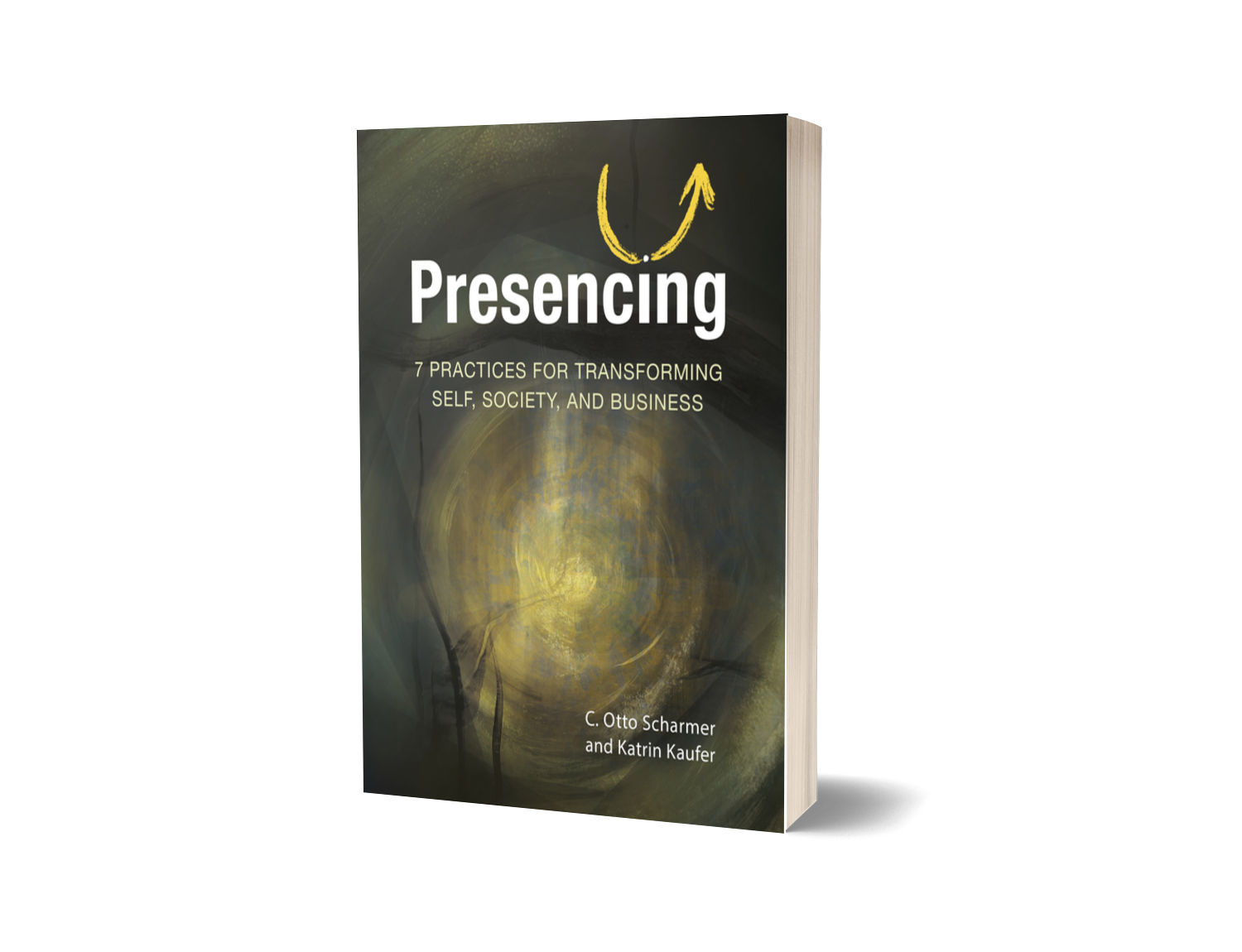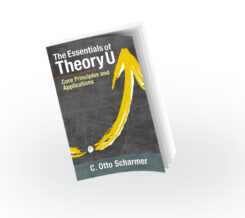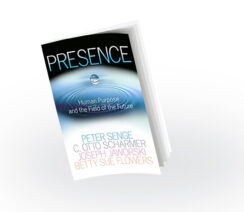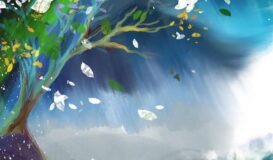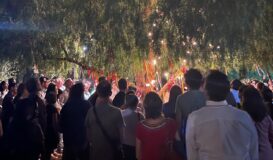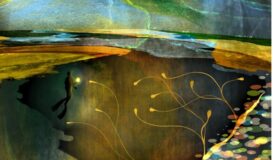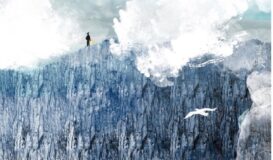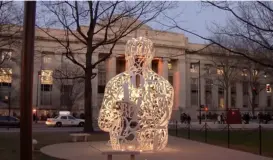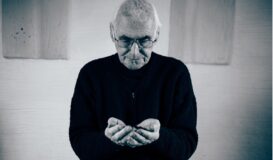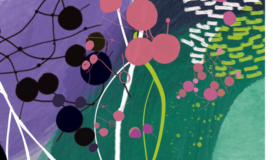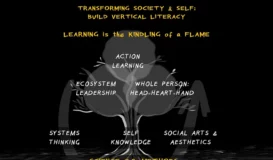PRESENCING:
7 Practices for Transforming Self, Society, and Business
Co-authored by Otto Scharmer and Katrin Kaufer, this groundbreaking guide offers 7 transformative practices to catalyze multi-system change and planetary healing. Blending proven frameworks like Social Fields with real-world stories of global change-makers, it provides a powerful pathway to collective transformation.
Amid today’s crises, small "islands of coherence" are paving the way for a new planetary movement. Learn how to unlock generative listening, presencing, and ecosystem leadership to co-create a future of unity and flourishing. Your local actions can ripple outward to inspire global change—be part of the next renaissance.
Interested in Bulk Orders & Custom Editions? Please contact: bookorders@bkpub.com
Praise for the Book

"This book provides a new language and teaches us new ways to integrate the insights of the psychology of mindfulness with the sociology of groups and the forces of the political and economic system. It is an incredible tour de force."
Carrie Hessler-Radelet
Former Peace Corps Director and International NGO Leader

“For two decades, Katrin and Otto have been helping thousands of people and hundreds of communities build capacity to hold the tensions of ‘either-or’. Now this book offers the guidance to build capacity for meeting this extraordinary time on its own terms.”
Peter Senge
MIT and Center for Systems Awareness

“What we learn from Presencing is that seeding the soil of consciousness with holistic understanding elevates the highest potential of a society.”
Pedro Tarak
Co-Founder, Sistema B and Regional Impact Trade Alliance (RITA)

“I’ve experienced firsthand the profound impact of Otto and Katrin’s transformative work. This book gives us the framework, methods, and tools to co-create and further evolve regenerative businesses that are working for all.”
Eileen Fisher
Fashion Designer and Founder of Eileen Fisher Inc.

“Presencing introduces practical tools and methods to confront disruption and how to counter is and discern our North Star – not only for us individually, but also for the institutions we lead and work in, and the societies we live in.”
Dayna L. Cunningham
Pierre and Pamela Omidyar Dean Jonathan M. Tisch College of Civic Life
Podcast Interviews
- 2025 Remembering Johan Galtung - Sohail Inayatullah & Otto Scharmer, Future Pod, September 2025
- 2025 Three voices sabotaging change, Change Signal Podcast, June 2025
- 2025 What Needs to Change Now, The Way Forward: Regenerative Conversations Podcast, May 2025
- 2025 An Education for Transforming Self, Society and Business? A Conversation with Otto Scharmer. Future Learning Design Podcast, March, 2025
- 2025 Changing Systems. Mind and Life Podcast, March, 2025
- 2024 Simon, T., Scharmer, O. (2024). What future is wanting to emerge through you? Podcast interview in Sounds True Podcast. https://resources.soundstrue.com/podcast/otto-scharmer-what-future-is-wanting-to-emerge-through-you/
Selected Publications
- 2026 Seven-Step Presencing Practice. Field of the Future Blog, Medium, January, 2026
- 2025 Cultivating Planetary Coherence: What 20 Years of Presencing Teach Us About Actualizing Emerging Futures. Field of the Future Blog, Medium, December, 2025
- 2025 Scharmer, O. (2025). Presencing: Das Potenzial des Moments. Illusion der Insignifikanz als Herausforderung unserer Zeit. OrganisationsEntwicklung, 4/25. © Deutscher Fachverlag GmbH. Verfügbar unter: www.zoe-online.org
- 2025 The Fourth Horizon: A Mountain Meditation from Val Fex Part I: Systems & Paradigms Collapse and Shift. Field of the Future Blog, Medium, August, 2025
- 2025 The Fourth Horizon: A Mountain Meditation from Val Fex Part II: Civilizational & Spiritual Collapse and Reemergence. Field of the Future Blog, Medium, August, 2025
- 2025 Universities as Innovation Ecologies for Human & Planetary Flourishing. Field of the Future Blog, Medium, March, 2025
- 2025 An Education for Transforming Self, Society and Business? A Conversation with Otto Scharmer. Future Learning Design Podcast, March, 2025
- 2025 Entering 2025: Meeting the Future In The Moment. What is Ours to Do? Field of the Future Blog, Medium, January, 2025
- 2025 A farmer who puts his hand to the plow must look forward. Field of the Future Blog, Medium, January, 2025
- 2024 An Emerging Third Option: Reclaiming Democracy from Dark Money & Dark Tech. Field of the Future Blog, Medium, November, 2024
- 2024 Indonesia's Role in an Emerging New Practical Order. LinkedIn, November, 2024
- 2024 Scharmer, O., & Pomeroy, E. (2024). Fourth Person: The Knowing of the Field. Journal of Awareness-Based Systems Change, 4(1), 19-48. https://doi.org/10.47061/jasc.v4i1.7909
- 2024 Bristow, J., Bell, R., Wamsler, Ch., Björkmann, T., Tickell, Ph., Kim, J., Scharmer, O., The system within: Addressing the inner dimensions of sustainability and systems transformation. Earth4All: Deep Dive Paper 17
- 2024 Johan Galtung: Peace with Peaceful Means. Field of the Future Blog, Medium, February, 2024
- 2023 2023 In Eight Points: Meditating On Our Planetary Moment. Field of the Future Blog, Medium, December 2023
- 2023 Philanthropy 4.0: What Form Of Giving Enables Transformative Change?, Field of the Future Blog, Medium, December 2023
- 2023 In memory of Ed Schein: From Accessing Your Ignorance to Accessing Your Love. JASC, May 2023
- 2023 Protect the Flame: But where the danger is, the saving power also grows. Field of Future Blog, April 2023
- 2022 Transforming our economies from ego to eco. Earth4All: Deep-Dive Paper 12. October 2022.
- 2022 The Navigation System, The Planetary Gardener, and the Prism: Metaphors for Bringing the Future into Being. Sohail Inayatullah, Emma D. Paine, Otto Scharmer, JASC, November 2022
- 2022 Awareness-Based Action Research: Making Systems Sense and See Themselves. Chapter In book: The SAGE Handbook of Participatory Research and Inquiry (pp.633-648). SAGE. Scharmer O., Kaufer K. Pomeroy E. 2022
- 2022 Protect the Flame, Circles of Radical Presence in Times of Collapse. Club of Rome Blog. Otto Scharmer, October 2022
- 2021 Social Scientists Confronting Global Crises, Jean Bartunek. Chapter: The social field as a teacher, Seven principles for building transformational learning infrastructures, C. Otto Scharmer, 2021
- 2021 Kunst der Veränderung: Vorurteilslose Führung und Organisationsentwicklung. Kapitel Ed Schein: Der bescheidene Pädagoge, Schlüsselprinzipien. 2021
- 2021 Journal of Awareness-Based Systems Change: The Birth of a Journal. Oliver Koenig, Megan Seneque, Eva Pomeroy, Otto Scharmer. 2021
- 2020 Lernen und Fuhrung in Zeiten von Umbruch. Grundfragen und Trends, HRM; June 2020.
- 2020 Action Confidence: Laying Down the Path in Walking. Field of the Future Blog, Medium. Scharmer, O., & Pomeroy, E. (2020, October 7)
- 2019 Social Systems As If People Mattered. Response to the Kühl Critique of Theory U. Journal of Change Management; 2019.
- 2019 Upgrading change management: Claus Otto Scharmer on the legacy and future of Change Management. Gruppe. Interaktion. Zeitschift für Angewandte Organisationspsychologie. C. Otto Scharmer, Falko von Ameln. 2019
- 2018 Our Obsession With Economic Growth Ignores Everything That Makes Life Worthwhile. The Blog Huffpost. 2018
- 2018 It Takes a Journey. Indian Management: June 2018.
- 2018 How to Escape your Organizations's Echo Chamber. Conscious Company Media. June 11, 2018.
- 2018 An Apple Shows Just How Broken Our Food System Is. The Blog Huffpost. May 27, 2018.
- 2017 4.0 Lab: Inventing the Future of Food, Finance, Health, Ed, & Management. The Blog Huffpost June 27, 2017
- 2017 Transforming Capitalism: 7 Acupuncture Points. The Blog Huffpost, April 1, 2017
- 2016 WAS KÖNNEN WIR TUN? Das Herz eines neuen Aktivismus. Evolve Magazin Fur Bewusstsein Und Kultur. Aktuelles Heft, Ausgabe 12/2016.
- 2016 Scharmer, Otto: Universität als Ort der Erneuerung. In: Kovce, Ph, and B. Priddat (eds): Studium der Zukunft. Aussichten der Universitat.
- 2015 Awareness-Based Action Research: Catching Social Reality Creation in Flight. By Otto Scharmer and Katrin Kaufer. in: Hilary Bradbury (ed), Action Research, 3rd edition. L.A.: Sage, 2015, pp. 199.
- 2015 Theory U: From Ego-system to Eco-system Economies. The Journal of Corporate Citizenship. Otto Scharmer and Adam Yukelson. No. 58, Large Systems Change: An Emerging Field of Transformation and Transitions (June 2015), pp. 35-39 (5 pages)
- 2015 The Blind Spot: Uncovering the Grammar of the Social Field. The Blog Huffpost Jun 6, 2015
- 2015 Journal of Management, Spirituality & Religion. Taylor & Francis Group; Exploring transcendental leadership: a conversation. J. Barney, J. Wicks, C.O. Scharmer & K. Pavlovich.
- 2015 Awareness-based action research: Catching social reality creation in flight. In H. Bradbury (Ed.). The SAGE Handbook of Action Research, 3rd ed (pp. 199-210). SAGE. Scharmer, O. & Kaufer, K. 2015
- 2014 8 institutional innovations that could update the economic system. The Guardian. Otto Scharmer. 2014
- 2013 SoL Reflections, Vol.13, #2, Leading the Relational Inversion from Ego to Eco, Scharmer and Kaufer, 2013.
- 2013 Perspectives on Theory U: Insights from the Field. Gunnlaugson, O. & Scharmer, O. (2013). Presencing Theory U, In Gunnlaugson, O., Baron, C., Cayer, M. (2013). IGI Global Press
- 2013 Open Democracy, From ego-system to eco-system economies by Otto Scharmer, 23 September 2013.
- 2013 Financial Times. Schools can help spark change required to address world crisis, by Otto Scharmer September 1, 2103 edition.
- 2013 Evolve, Magazin für Bewusstsein und Kultur, 2013 - An interview with Otto Scharmer.
- 2013 America Emerging - Western Civilization 2.0 by Otto Scharmer, November 2013, Schumacher Center for a New Economics
- 2013 30 Years of Building Learning Communities: A Dialogue with Peter Senge, Otto Scharmer, and Darcy Winslow. Reflections: The SoL Journal on Knowledge, Learning, and Change, Volume 12 and Volume 13.
- 2011 Change Management Morgen–13 Thesen, published in OrganisationsEntwicklung Nr.4, p.36-39.
- 2010 Seven Acupuncture Points for Shifting Capitalism to Create a Regenerative Ecosystem Economy, Scharmer, C. O., Oxford Leadership Journal, June 2010, Volume 1, Issue 3.
- 2009 Zukunft entsteht aus Krise, Riemann Verlag, Random House GmbH
- 2008 Führung vor der leeren Leinwand. Kaeufer, K., Scharmer C.O.. Published in Organisations Entwicklung, Nr. 2, p. 4-11.
- 2007 Uncovering the Blind Spot of Leadership. Scharmer, C.O., Executive Forum: Leader to Leader.
- 2007 Executive Summary: Theory U: Leading from the Future as it Emerges (2 pages and 17 pages)
- 2004 Awakening Faith in an Alternative Future. Senge, P.; Scharmer, C.O.; Jaworski, J.; Flowers, B.S.. In: Reflections: The SoL Journal on Knowledge, Learning and Change (Cambridge, Mass.). Vol. 5, no. 7
- 2003 Breathing Life into a Dying System. Kaeufer, K; Scharmer, C.O.; Versteegen, U. In: Reflections: The SoL Journal on Knowledge, Learning and Change (Cambridge, Mass.). Vol. 5, no. 3
- 2002 Presencing: A Social Technology of Freedom. Interview with Dr. Claus Otto Scharmer.
- 2002 Learning Communities: Toward a Triadic Differentiation of Learning Networks (with Peter Senge). In: Heinrich v. Pierer und Bolko von Oetinger (Hrsg.) A Passion for Ideas. How Innovators Create and Shape Our World, 87-105. West Lafayette, Indiana: Purdue University Press.
- 2002 Illuminating the Blind Spot. Leadership in the Context of Emerging Worlds, Summary Paper on an Ongoing Research Project (with W. Brian Arthur, Jonathan Day, Joseph Jaworski, Michael Jung, Ikujiro Nonaka, Peter M. Senge) In: Leader to Leader, Spring 2002.
- 2001 The Pentagon Praxis. (with U. Versteegen, K. Kauefer) In: Reflections: The SoL Journal on Knowledge, Learning and Change (Cambridge, Mass.). Vol. 2, no. 1, pp 29-40.
- 2001 Self‐transcending knowledge: sensing and organizing around emerging opportunities." Journal of knowledge Management 5.2 (2001): 137-151.
- 2001 Illuminating the Blind Spot. In: Leader to Leaders, Spring 2002 (w/W. Brian Arthur, Jonathan Day, Joseph Jaworski, Michael Jung, Ikujiro Nonaka, Peter M. Senge).
- 2001 Community Action Research (with Peter Senge). In: Peter Reason and Hilary Bradbury (eds.), Handbook of Action Research. Thousand Oaks, Calif.: Sage Publications.
- 2000 Universities as the Birthplace for the Creating Human Being. (with K. Kaeufer). In: Reflections: The SoL Journal on Knowledge, Learning and Change (Cambridge, Mass).
- 1998 Jenseits von Hierarchien (with Peter Senge), Bundesministerium für Bildung, Wissenschaft, Forschung und Technologie 2/1998. (Published by the German Ministry for Education, Science, Research and Technology).
- 1997 Von "Learning Organizations zu "Learning Communities": Über die Produktionsbedingungen gemeinsam hervorgebrachten Wissens (From Learning Organizations to Learning Communities: On the Conditions of Cogenerating Knowledge) (with Peter Senge). In: Heinrich v. Pierer und Bolko von Oetinger (Hrsg.), Wie kommt das Neue in die Welt? S. 99-111. München: Hanser Verlag.
- 1996 Reflexive Modernisierung des Kapitalismus als Revolution von innen. Auf der Suche nach Infrastrukturen einer lernenden Gesellschaft (Reflective Moderization of Capitalism: Toward Infrastructures of a Learning Society). Stuttgart”: Schaffer-Poeschel.
- 1996 Infrastrukturen für lernende Organisationen (Infrastructures for Learning Organizations) (with Peter Senge). In: Zeitschrift für Führung und Organisation, Heft 1, pp. 32-36.
- 1995 Strategische Führung im Kräftedreieck Wachstum-Beschäftigung-Ökologie. Journal für Betriebswirtschaft 65(6):633. C. Otto Scharmer. 1995
